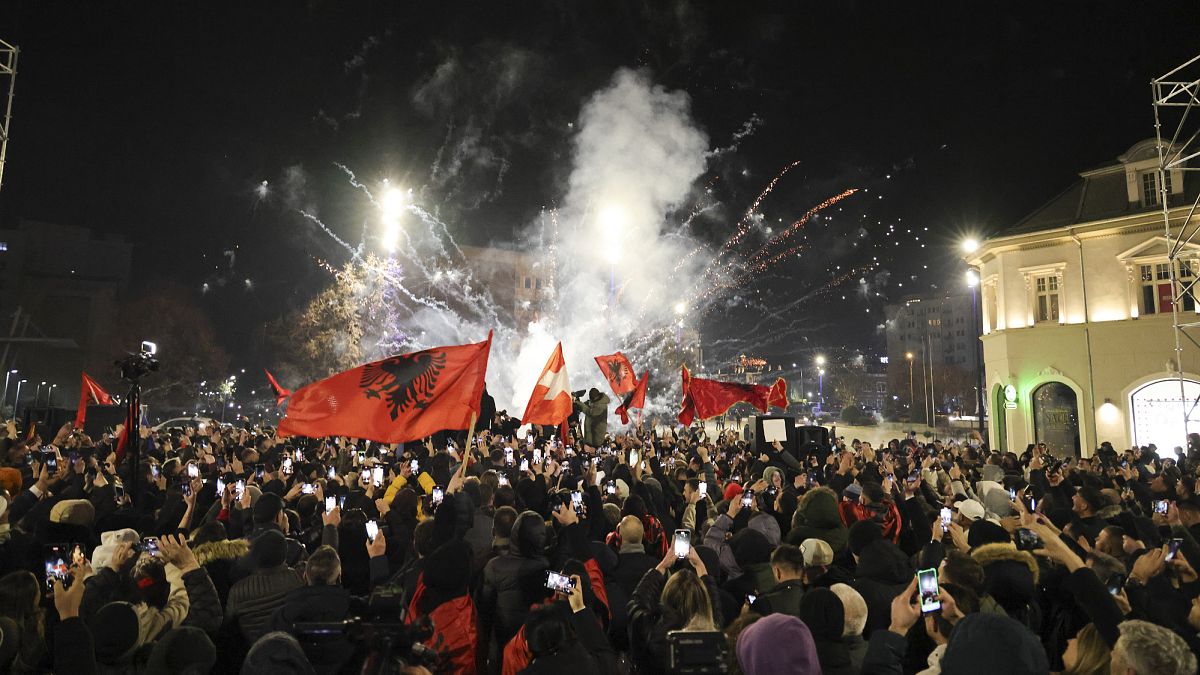Europe
Kosovo election exit polls show PM Albin Kurti’s party in lead

Kosovo’s Legislative Elections: A Glimpse into a Nation’s Struggles and Hopes
Kosovo, a small nation in the Balkans, recently held its legislative elections amid a backdrop of economic stagnation and heightened ethnic tensions. The polls were marked by low voter turnout, with only about 28% of eligible voters casting their ballots by mid-afternoon. Thisphasizes the challenges the country faces in engaging its citizens in the political process. Despite the low turnout, the Central Election Commission reported that the elections proceeded smoothly, with preliminary results indicating that the incumbent Prime Minister Albin Kurti’s party, Vetevendosje!, was leading with 41.99% of the votes counted. Kurti’s party, known for its leftist and nationalistic stance, has positioned itself as a force for change, appealing to voters frustrated with the status quo.
Yet, the election results also highlighted the fragmented political landscape of Kosovo. Vetevendosje! fell short of securing a majority, winning just under 42% of the vote, which means Kurti will need to form a coalition government if he is to remain in power. However, Kurti has previously ruled out collaborating with opposition parties, raising questions about the viability of forming a stable government. The second and third-placed parties, the Democratic Party of Kosovo (PDK) and the Democratic League of Kosovo (LDK), secured 21.4% and 19.3% of the vote, respectively. These parties have traditionally been major players in Kosovo’s politics, but their influence has waned over the years due to internal conflicts and declining public trust.
The low voter turnout in Kosovo’s elections reflects deeper societal disengagement and disillusionment with the political class. Many citizens feel that successive governments have failed to address pressing issues such as poverty, unemployment, and corruption. The country’s economic struggles are particularly concerning, with Kosovo being one of the poorest in Europe, boasting an annual GDP per capita of less than €6,000. The lack of job opportunities has driven many young people to emigrate, leaving behind an aging population and a shrinking workforce. Political parties have pledged to improve public services, increase salaries and pensions, and attract foreign investment, but their promises have been met with skepticism due to a lack of detailed plans or funding sources.
Moreover, the elections took place against a backdrop of renewed ethnic tensions, particularly between Kosovo’s Albanian majority and its Serb minority. The government’s recent measures, such as banning the use of the Serbian currency and restricting transfers from Serbia to ethnic Serbs in Kosovo, have heightened tensions and drawn criticism from Western powers. The United States, the European Union, and the NATO-led peacekeeping force KFOR have urged Kosovo to avoid unilateral actions that could reignite inter-ethnic conflict. Brussels has even suspended funding for certain projects, conditioning their resumption on Kosovo’s efforts to de-escalate tensions in the north, where most of the ethnic Serb population resides. These developments underscore the delicate balance Kosovo must strike between asserting its sovereignty and maintaining stability in a region with a history of conflict.
Despite these challenges, Kosovo’s elections represent a significant milestone in the country’s post-independence journey. This is the first time since Kosovo declared independence in 2008 that its parliament has completed a full four-year mandate, signaling a degree of political stability. The elections were also the ninth since the end of the 1998-1999 conflict between Serbian forces and ethnic Albanian separatists, which led to NATO intervention and the eventual establishment of Kosovo as an independent state. However, Kosovo’s statehood remains contested, as Serbia, backed by Russia and China, refuses to recognize its independence. This ongoing dispute continues to cast a shadow over Kosovo’s international relations and domestic politics.
The elections also highlighted the resilience of Kosovo’s democratic institutions and the commitment of its people to the democratic process. Nearly 1,700 observers from international organizations, including the EU and the Council of Europe, monitored the vote, praising the overall conduct of the elections. The presence of these observers not only lent credibility to the process but also demonstrated Kosovo’s integration into the broader European community. As the country looks to the future, the challenge will be to translate the election results into meaningful reforms that address the pressing needs of its citizens, bridge ethnic divides, and pave the way for sustainable economic growth. Whether Kurti’s government can rise to meet these challenges remains to be seen, but one thing is clear: the road ahead will require visionary leadership, inclusive policies, and a renewed commitment to unity and progress.











